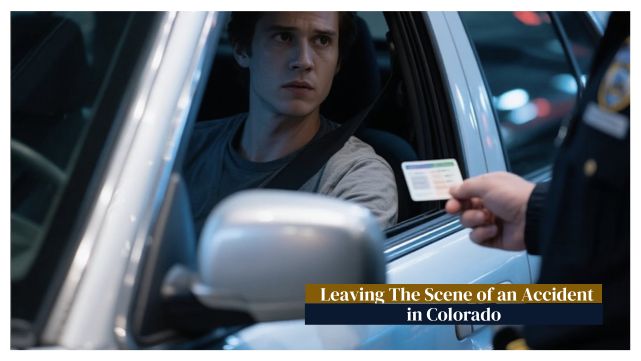Short Answer: Forever.
Traffic convictions will permanently stay on your record in Colorado. However, keep reading, because there are some important things to know about points and your motor vehicle history.
Traffic tickets are among the most frequently issued violations every year. They can also be surprisingly costly. We are in the digital age, and these infractions can remain on your driving record forever in Colorado. Every State will have different rules and regulations on what goes on your record, and how long it stays there. But in Colorado, if you’ve been convicted of a pointed traffic offense, the conviction and points will still show up in 2055, and 2125. This doesn’t mean that they will necessarily “haunt” you forever, but it could affect your insurance, and too many points over a period can revoke your license.
When we pull a Colorado MVR (motor vehicle record), we see what happened 30 years ago, and longer. And on some matters that can make a BIG difference. Take, for example, a DUI conviction (12 points) or a DWAI (8 points) that happened in 1992. Do the points affect you? Not in the sense of a point suspension, but the conviction sure does. If you were to get another drunk driving charge, the mandatory minimum penalties are much stiffer on a second offense in Colorado.
Even going a few miles per hour over the speed limit can result in a citation. That is why it’s crucial to be aware of the penalties tied to traffic in Colorado.
Ok, the points are on there forever, but how long do they really “count”?
This is an important distinction. For adults, you face a license suspension at 12 points in a year. This is not a calendar year, but in a 12-month consecutive time period. Or, if you obtain 18 or more points in 2 years. Note: Minors have a different point schedule.
Can I seal a traffic offense?
Class 1 or 2 misdemeanor traffic offenses, class A or B traffic infractions, and DUI convictions are not eligible for sealing.
DUI charges may be sealable if your charges are dismissed, or you complete a successful deferred sentence. If you are acquitted or the case is otherwise dismissed, it is eligible for immediate sealing. The same applies for a successful DUI/DWAI deferred sentence.
Understanding a Traffic Ticket Record – What Is It?
A traffic ticket record in Colorado shows your history of traffic violations, including speeding, reckless driving, and other infractions. The Colorado Department of Motor Vehicles (DMV) maintains and updates this record regularly. Insurance companies, employers, and law enforcement can access this information.
Every violation adds points to your record under Colorado’s driver’s license point system.
If you accumulate too many points, the DMV can suspend your license. For example, adult drivers who collect 12 points in 12 months risk suspension. Each violation adds a specific number of points, depending on its severity.
Drivers often overlook how long violations stay on their record. Insurance premiums may increase, especially if the violation suggests risky driving behavior. Keeping your record clean protects your driving privileges and financial well-being.
Types of Traffic Violations
Minor violations include common offenses like speeding slightly over the limit, failing to signal, or improper lane changes. These typically carry fewer points and a lower fine. However, they still go on your driving record and can affect your insurance rates for several years.
Major violations, on the other hand, involve more serious or dangerous behavior. Some examples include:
- Reckless driving (8 points),
- DUI (12 points),
- DWAI (8 points),
- Driving with a suspended license, or leaving the scene of an accident (12 points)
These offenses result in higher point penalties and carry criminal consequences, even possible jail time.
Courts and insurance companies treat these very seriously, often leading to long-term consequences. Maintaining a clean driving history helps protect your freedom on the road and your wallet.
Moving vs. Non-Moving Violations
Traffic violations also fall into 2 other categories: moving and non-moving.
A moving violation occurs when the vehicle is in motion and the driver breaks the law. Speeding, running a red light, or failing to yield are common examples. These infractions usually add points to your license and permanently stay on your record.
Non-moving violations happen when the vehicle is not in motion or when the issue doesn’t relate to how the car is operated. Parking tickets, expired license plates, or broken tail lights fall into this category. These don’t usually result in points, but unpaid fines can escalate.
Many drivers dismiss non-moving violations, which is not a good idea.
How Long Does a Warning Ticket Stay on Your Record?
In Colorado, warning tickets, whether verbal or written, will not appear on your official driving record. Verbal warnings are informal and leave no trace in your driving history. On the other hand, the issuing officer documents the written warnings. It typically remains within the local law enforcement agency’s internal records. It does not impact your driving record or insurance rates. Only convictions will appear on your driving record and criminal history.
Do Convictions for Traffic Offenses Go on Your Record?
Yes, traffic convictions appear on your record. Once you are convicted in Colorado, the court will send the conviction (including the number of points) to the DMV. The DMV will record it on your Colorado driving record. The state officially logs the ticket if it involves a pointed violation like speeding or reckless driving.
While points from these violations drop off after 2 years, the violation stays on your record.
What Do You Do If You Get A Speeding Ticket In Colorado?
If you get a speeding ticket, you have two main choices: pay or fight it. The decision depends on a range of factors. Sometimes, fighting the ticket is the right move, especially if you already have points on your driving record. You may also decide that a plea bargain, that drops points or the fine, is in your best interest.
All points push you closer towards a license suspension. Maybe you didn’t commit the violation, or there are errors on the ticket. Then, contesting it might be worth your time.
Paying the fine may seem more manageable, especially if the ticket is minor and does not add many points. In many situations, it’s more convenient and cheaper to pay than to go through a legal process. That is particularly true if legal fees cost more than the speeding ticket.
This is where a lawyer can help. An experienced traffic attorney understands local laws and court procedures. They can review the details of your case and look for errors or inconsistencies in the ticket. They might negotiate a reduction in fines or penalties—or even dismiss the case entirely.
A lawyer can also represent you in court, saving you from taking time off work or navigating the legal system alone.
How long does a speeding ticket stay on your record?
In Colorado, a speeding ticket stays on your DMV record for seven years, during which it’s visible to insurers and employers. However, DMV only counts points from the last 24 months when considering suspensions
How Speeding Tickets Impact Auto Insurance?
Speeding tickets almost always affect auto insurance rates, and multiple violations can cause significant increases. Insurance companies have a ton of factors they consider like:
- How fast you were driving, your driving record
- Your insurance history when adjusting premiums.
Your provider and policy length further influence how much your rate changes. Remember that the length of a traffic ticket on your record can continue impacting your premiums for years.
Myths About Traffic Tickets and Your Record
Many drivers misunderstand how traffic tickets affect their records. This leads to confusion, poor decisions, and long-term consequences. Misinformation spreads fast, and, unfortunately, myths often influence how people react if they get two speeding tickets or fail to pay a fine.
Traffic violations have lasting impacts, especially in states like Colorado, where records and points matter.
Myth 1: A Traffic Ticket Disappears After You Pay It
Many people think once they pay a traffic ticket, it just vanishes. That’s not true. Paying a fine means you accept guilt, and the violation goes on your record, along with the attendant points.
Myth 2: If You Get Two Speeding Tickets, Only the Latest One Counts
Many drivers believe older tickets don’t matter once a new one arrives. That’s false. If you get two (or more) speeding tickets in Colorado, both will count toward your license point total.
Accumulating too many points in a short period can lead to a suspended license. Each offense stacks up; it does not reset the counter.
Myth 3: Minor Speeding Tickets Don’t Affect Your Insurance Rates
Some people assume insurance companies ignore more minor violations. In truth, any ticket, can impact your premium. Providers check your driving history and increase your rate based on recent activity.
Even a first offense can cause a bump. If you get two speeding tickets, your insurer could see you as a higher risk and hike your rates.
Myth 4: What Happens If You Don’t Pay a Speeding Ticket? Nothing Serious
This myth causes a lot of headaches. Ignoring a fine doesn’t make it go away. If you don’t pay a speeding ticket, or appear in court as required, in Colorado, the court may issue a bench warrant or enter a default conviction based on your failure to appear.
You could face license suspension, additional fees, or even arrest. Your fine can also go to collections, which damages your credit. We suggest you take tickets seriously, as they always cost less in the long run.
Myth 5: You Don’t Need a Lawyer for a Traffic Ticket
Some drivers assume hiring a lawyer isn’t worth it for traffic violations. But legal help can be a wise investment. An experienced attorney can uncover technical errors, negotiate lower charges, or even get the case dismissed. Especially if you get tickets with high points or high fines, a lawyer can protect your driving privileges and save you money over time.
McDowell Law Firm- When Should You Hire Us?
Our experienced traffic defense lawyers understand the complexities of traffic law in Colorado and know how to challenge errors, reduce penalties, or even get tickets dismissed.
Legal representation can make a big difference whether you are facing one citation or multiple. Don’t navigate the legal system single-handedly. Let our defense attorneys protect your record and your future behind the wheel.
Contact McDowell Law Firm today for a free consultation, and let us help you fight your ticket with confidence.



